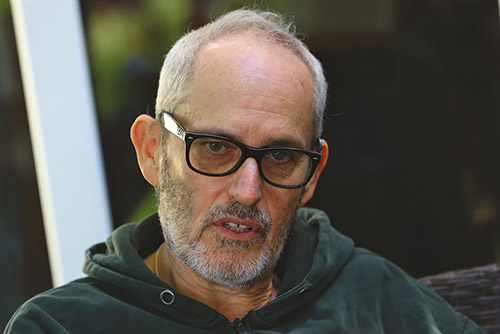
János Szász, the acclaimed director of stage and screen born in Hungary in 1958 to Holocaust survivors, has come to the devastating conclusion that the land he loves has become hostile and dangerous for him and his family.
Szász was born, raised and educated in Budapest, where he became a filmmaker and theater director. He wanted to live his life as a patriotic Hungarian proud of his Jewish heritage. His 8-year-old son, Jakob, is a student at the Ronald Lauder Jewish Day School.
Szász spent 2001-2003 at Harvard University, where he was the director of Harvard’s University’s American Repertory Theater Institute and served on the faculty. He then returned to Hungary to make films and rejoin the faculty of the prestigious University of Theatre and Film Arts Budapest.
Hungary has become increasing despotic and anti-Semitic since right-winger Viktor Orbán was elected prime minister in 2010. In the fall of 2020, his government decided to appoint their own lackeys to supervise academics and professors, lest they introduce students to liberal ideas. (The government conflates liberalism with Judaism.)
Szász and his fellow faculty members were forced to tow the party line or resign. The faculty resigned en masse and the students went to the barricades to support them. Although he was on the university faculty for more than two decades, Szász is not entitled to a pension as, officially, he is a resignee.
Szász is now desperate to leave Hungary, not for financial reasons, but because he believes he and his family are facing a real and present danger.
In the early morning hours of February 5, Szász and his family were roused from their sleep by eight armed police officers. The officers wore Hazmat suits because János and his wife had tested positive for COVID. (They are negative now.) The invasion of their home lasted eight hours, and included an interrogation of the Szász’s 15-year-old son, Peter, who was secreted into another room without his parent’s awareness or permission. At the end of the terrifying day, the police force removed all the family’s phones, computers, drives and files.
The raid raised second- and third-generation post-traumatic stress issues for the family, who currently lives in fear, especially as evening approaches. Without access to their phones and computers they feel cut off from the world. Additionally, with all records of his work now in the hands of the government, János feels that his identity is being erased. In fact, the self-professed workaholic is unable to edit his last film.
János’ current project is “The Lost Wife,” a feature film based on Alyson Richman’s bestselling Holocaust novel of the same name. It’s not the first time János has made a film on the subject. In 2000, Steven Spielberg engaged him to film a documentary, “The Eyes of Holocaust,” as part of the Shoah Foundation’s “Broken Silence” series.
“The Lost Wife” is set in Theresienstadt, the so-called “model camp” that housed the crème de la crème of Jews in the arts. Because the Nazis spread lies that it was a haven for cultured and influential Jews, some Jews of means actually bribed their way into what they thought would be a safe haven. The “best” of the 42,500 concentration camps and ghettos, it was, nevertheless, more hell than heaven.
This project has meaning for János, whose parents both survived the Holocaust. His mother, a native of the large city of Szeged, spent the war in hiding with her mother. His father and grandfather were from Budapest. János is alive because his grandfather saved himself and his son from the Danube executions, during which they took the risk of walking away. The two were eventually caught and force-marched to concentration camps in Germany, including Dachau, from which they were ultimately liberated.
After his liberation from Dachau, János’ father, Peter, never spoke of his experiences. He married and tried to live a normal life as a screenwriter in postwar Hungary. It was not until his funeral that János learned what his father had endured under the Nazis.
Peter, although not an observant Jew, taught his son to remember his Jewish heritage and take pride in it. During the war, Peter lost his faith in God, but never his allegiance to the Jewish people. He taught his son, “Never forget you’re a Jew.”
Beyond the threats to his existence, János is exasperated, furious and resolute. He has said that all he wants to do is work and live with his family in freedom.
“I won’t live in fear and trudge along with my head down,” János said. His determination is inspiring.
Barbara Wind is a Holocaust scholar and lecturer, published writer and poet, and former director of the Holocaust Council of Greater MetroWest.













